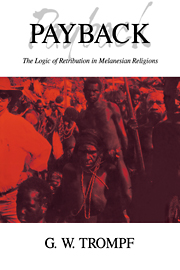Conclusions and Recommendations
Published online by Cambridge University Press: 22 September 2009
Summary
What we have been finding in the southwest Pacific is of universal significance. Nowhere else on earth have so many small-scale societies and religions been locked up in the one domain, ‘hermetically sealed’ from outside contact until the recent days of modern European imperialisms. Nowhere else have the nature and pace of technico-social change been of such dramatic consequence for so many distinct cultures. Yet the human problems and issues arising out of each and all of the Melanesian microhistories thus far reviewed, as well as those laid bare through the experiences of proto- and emergent-nationalisms, are of profound importance for the human species as a whole. One reality remains sure: the complexes of thought and actions we call payback, reflecting as they do our ratio or humanity's universally recognizable principles of thinking, and manifesting as they have in a host of particular syndromes—such as war and peaceful resolve, blaming and forgiveness, punishment and mercy, uncooperativeness and active exchange, and so forth—will never leave us alone. In these complexes lie the chief problems and yet also the best promises of our general condition. The message from Melanesia to the rest of the world is precisely this, because in Melanesia the issues are curiously sharpened. There, perhaps, ‘modern’ military confrontation may not seem so significant, although long-term guerilla struggles over West Papua and Bougainville look inevitable. But in the persistence of tribal warfare we are jolted into imagining how the demon of war might have first inflicted itself on us.
- Type
- Chapter
- Information
- PaybackThe Logic of Retribution in Melanesian Religions, pp. 457 - 460Publisher: Cambridge University PressPrint publication year: 1994

